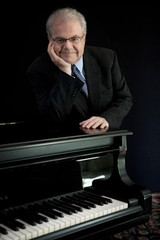|
Back
Contrast and contradiction Ottawa
Southam Hall, National Arts Centre
10/08/2014 - & October 9, 2014
Ralph Vaughan Williams: Fantasia on a Theme by Thomas Tallis
Wolfgang Amadeus Mozart: Piano Concerto No. 14 in E-flat major, K. 449
Richard Strauss: Burleske in D minor for Piano and Orchestra
Edward Elgar: Sospiri for Cello and Strings, Op. 70
Malcolm Forsyth: A Ballad of Canada
Emanuel Ax (piano), Amanda Forsyth (cello)
Ottawa Choral Society, Cantata Singers of Ottawa, Ewashko Singers, Ottawa Festival Chorus, Duain Wolfe (chorus master), Laurence Ewashko (associate chorus master), National Arts Centre Orchestra, Pinchas Zukerman (conductor), Jayce Ogren (guest conductor)

E. Ax (© Lisa Marie Mazzucco)
The National Arts Centre Orchestra departs shortly for a tour of the UK, and this week’s program in Ottawa, primarily under the baton of music director Pinchas Zukerman, offered a sampling of works to be presented in Edinburgh, Nottingham, London, Salisbury and Bristol later this month. There were striking contrasts and sometimes striking contradictions, or at least surprises during the Wednesday performance.
The orchestra can be expected to endear itself to British listeners if the opening reading of Vaughan Williams’ Fantasia on a Theme by Thomas Tallis, scored exclusively for strings, represents its best current work. Notwithstanding the composition’s origins with ecclesiastical music from five centuries ago, the performance revealed with remarkable clarity the timeless, hypnotic quality of this music. The exquisite softness of the opening, leading to an exceptional range of dynamics within lower levels established a cosmic mood bringing the work from its historic and technical origins to something which is modern today, as it was when composed a hundred years ago. Zukerman knows how to get the best work from his string players, and delivered a performance which set the bar very high indeed.
Emanuel Ax is among today’s pre-eminent concert pianists. A brilliant virtuoso who came to prominence forty years ago, winning the first Arthur Rubinstein Competition, we might have expected a flashy, flamboyant interpretation of the Strauss Burleske and a more circumspect reading of Mozart’s Concerto No. 14, a work composed for one of Mozart’s students. In fact, what we heard was the decided opposite. Ax projected beautifully every note of the Concerto (and much more consistently than Jeremy Denk in another Mozart Concerto on the same Hamburg Steinway two weeks ago). Ever scrupulous, his playing projected warmth, clarity and lyricism. The second movement, Andantino, was beautifully sustained and the closing Allegro, ma non troppo adroitly avoided becoming humdrum. This was a remarkable reading of one of Mozart’s less familiar works.
In contrast, the Strauss Burleske was almost metronomic, even during the brief cadenzas, and at times didn’t project beyond the orchestra. The work’s youthful, exuberant, indeed deliberately frivolous mood didn’t sit comfortably with Ax. Perhaps his rapport with guest conductor Jayce Ogren was lacking (or lacked rehearsal). But even a transparently showy, generally immature pianist like Lang Lang, whose performance of the Burleske was telecast recently on PBS, came closer to the mark.
The evening’s second half opened with Elgar’s Sospiri, Op. 70, in a version (there are several others) for cello and strings, with the orchestra’s principal cellist Amanda Forsyth as soloist and Zukerman reinstated on the podium. This short, but lovely work again showcased the strings’ immaculate subtlety and served as a brief oasis for the entire concert.
Finally, there was A Ballad for Canada by the late Malcolm Forsyth, South African born and an émigré to Alberta during the 1960s. With multiple choral forces, this is an ambitious setting of several poems by noted Canadian authors (Ralph Gustafson, John McCrae, E.J. Pratt and Carl Hare), depicting land - The Yukon, then Newfoundland - as well as remembrances for wartime losses. The work earns a solid ‘A’ for effort, but doesn’t really come off. There is more impact, than genuine beauty, even with the exotic, finely wrought and consistently inventive orchestrations which are its strongest feature. Echoing Stravinsky, Copland, Ligeti and others, A Ballad for Canada is more like a movie score by Alex North or Miklos Rozsa than a major symphonic poem or requiem, and audience response was decidedly low key.
In all, this was an ambitious evening which didn’t always deliver what was intended, but certainly gave listeners much to contemplate and analyse.
Charles Pope Jr.
|